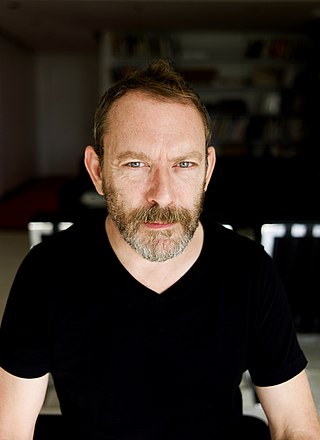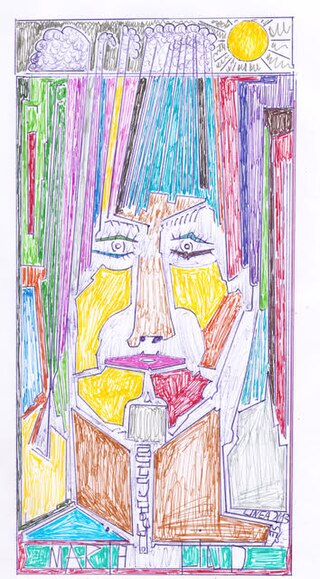Related Research Articles
Marjetica Potrč is an artist and architect based in Ljubljana, Slovenia. Potrč's interdisciplinary practice includes on-site projects, research, architectural case studies, and drawings. Her work documents and interprets contemporary architectural practices and the ways people live together. She is especially interested in social architecture and how communities and governments can work together to make stronger, more resilient cities. In later projects, she has also focused on the relationship between human society and nature, and advocated for the rights of nature.

Hans Ulrich Obrist is a Swiss art curator, critic, and art historian. He is artistic director at the Serpentine Galleries, London. Obrist is the author of The Interview Project, an extensive ongoing project of interviews. He is also co-editor of the Cahiers d'Art review. He lives and works in London.

Liam Gillick is a British artist who lives and works in New York City. Gillick deploys multiple forms to make visible the aesthetics of the constructed world and examine the ideological control systems that have emerged along with globalization and neoliberalism. He utilizes materials that resemble everyday built environments, transforming them into minimalist abstractions that deliver commentaries on social constructs, while also exploring notions of modernism.
Bidoun is a non-profit organization focused on art and culture from the Middle East and its diasporas. Bidoun was founded as a print publication and magazine in 2004 by Lisa Farjam, eventually expanding to online publishing and curatorial projects. The print edition of the magazine was in publication from spring 2004 until spring 2013.
muf is a collaborative of artists, architects and urban designers based in London, England, specialising in the design of the urban public realm to facilitate appropriation by users.

Keller Easterling is an American architect, urbanist, writer, and professor. She is Enid Storm Dwyer Professor and Director of the MED Program at Yale University.
Ingo Niermann is a German novelist, writer, and artist.

Eyal Weizman MBE FBA is a British Israeli architect. He is the director of the research agency Forensic Architecture at Goldsmiths, University of London where he is Professor of Spatial and Visual Cultures and a founding director there of the Centre for Research Architecture at the department of Visual Cultures. In 2019 he was elected Fellow of the British Academy.
Decolonizing Architecture Art Residency (DAAR) is an architectural studio, collective of architects and a residency program based in Beit Sahour, Palestine. DAAR was established to work on complex architectural problems in a region with strongly conflicting political forces, and is related to the Decolonizing Architecture Art Research collective.
Mark von Schlegell is an American science fiction writer and cultural critic. He lives in Germany and the U.S. His novels include Venusia (2005), which was honors listed for the James Tiptree, Jr. Award, Mercury Station (2009) and Sundogz (2015).
Shumon Basar is a British writer, editor and curator.

Armen Avanessian is an Austrian philosopher, literary theorist, and political theorist. He has taught at the Free University of Berlin, among other institutions, and held fellowships in the German departments of Columbia University and Yale University. His work on Speculative realism and Accelerationism in art and philosophy has found a wide audience beyond academia.
The term ‘critical spatial practice’ refers to forms of practice between art and architecture. Jane Rendell introduced the term in 2003. Rendell later consolidated and developed the term as one that defined practices located at a three-way intersection: between theory and practice, public and private, and art and architecture. For Rendell, critical spatial practice is informed by Michel de Certeau’s The Practice of Everyday Life, and Henri Lefebvre’s The Production of Space, as well as the critical theory of the Frankfurt School, but her definition aims to transpose the key qualities of critical theory – self-reflection and social transformation – into practice. In Rendell’s work, critical spatial practices are those that question and transform the social conditions of the sites into which they intervene, as well as test the boundaries and procedures of their own disciplines.
Jane Rendell is an architectural historian, cultural critic and art writer. She has taught at Chelsea College of Art and Design, Winchester School of Art, and the University of Nottingham. She has been based at the Bartlett School of Architecture at UCL since 2000, where she has been Professor of Architecture and Art since 2008, teaching primarily across the Situated Practice, Architectural History and PhD programmes. She was Director of Architectural Research (2004–10) and Vice Dean Research (2010-3). She is currently Director of Architectural History and Theory and leads the Bartlett’s Ethics Commission.
Elke Krasny is a cultural and architectural theorist, urban researcher, curator, and author. Her work specializes in architecture, contemporary art, urbanism, feminist museology, histories and theories of curating, critical historiographies of feminism, politics of remembrance, and their intersections. Krasny received her Ph.D. from the University of Reading. She is Professor of Art and Education at the Academy of Fine Arts Vienna. She worked as a visiting professor at the University of Bremen and the Academy of Fine Arts Nuremberg. In 2012 she was visiting scholar at the Canadian Centre for Architecture CCA, Montréal. In 2014, she was City of Vienna Visiting Professor at the Interdisciplinary Centre for Urban Culture and Public Space (SKuOR) at the Vienna University of Technology. Using the framework of political care ethic developed by Joan Tronto, Krasny works on developing a perspective of critical care for architectural and urban practice and theory. In 2019, together with Angelika Fitz she edited Critical Care. Architecture and Urbanism for a Broken Planet.
Forensic Architecture is a multidisciplinary research group based at Goldsmiths, University of London that uses architectural techniques and technologies to investigate cases of state violence and violations of human rights around the world. The group is led by architect Eyal Weizman. He received a Peabody Award in 2021 for his work with Forensic Architecture.
Hila Peleg is an international curator and filmmaker and the Dean of HaMidrasha – Faculty of the Arts starting September 2023. Peleg has curated solo shows, large-scale group exhibitions and interdisciplinary cultural events across the visual arts, film and architecture, in public institutions throughout Europe and internationally. She is also known for her documentary film work including her award winning feature film "A Crime Against Art" from 2007 and "Sign Space" from 2016.

Maria Lind is a Swedish curator, art writer and educator. Since 2020, she has been the Counsellor of Cultural Affairs at the Embassy of Sweden in Moscow.
Mechtild Widrich is an Austrian art historian, curator, and Professor at the School of the Art Institute of Chicago.
Christopher Roth is a German film director, artist and TV producer.
References
- ↑ "Crossbenching – Interview with Markus Miessen". Common Journal für Kunst & Öffentlichkeit.
- ↑ "Markus Miessen Back to the future #30". Klat Magazine. 20 September 2013.
- ↑ "Werdet politischer, Architekten!". Der Standard.
- ↑ "Staff card". University of Gothenburg. 22 December 2016. Retrieved 12 November 2018.
- ↑ "News from the Architectural Association" (PDF). ISSUE 4/SUMMER 2007.
- ↑ "Re: Participation – Markus Miessen and David Goldenberg". Fillip 10 – Fall 2009.
- ↑ Grosse, Julia (3 April 2009). "Trend zum vollen Haus". taz.de.
- ↑ "Markus Miessen". DLD Conference.
- ↑ "Studio Miessen – 19 Hours at the Kiosk". Haus der Kulturen der Welt. February 2018.
- ↑ "Performa Hub by nOffice". dezeen magazine. 22 November 2009.
- ↑ "Markus Miessen". Biennale of Sydney.
- ↑ "The Dilemma of Instrumentalization(or: From which Position is one talking?)" (PDF). tarynsimon.com.
- ↑ "Ausstellungseröffnung, "Stealth Architecture", 7. Februar 2013, 19 Uhr/ 7th February 2013, 7 pm". Weltkulturen Museum.
- ↑ "Join the Brutally Early Club". Paddle8.
- ↑ "Obrist and Miessen at the Brutally Early Club". Ecole Du Magasin.
- ↑ "Brutally Early Club". brutallyearlyclub.org.
- ↑ "Markus Miessen Back to the future #30". Markus Miessen: Crossbenching.
- ↑ Miessen, Markus; Grassegger, Hannes (26 June 2012). "Albtraum Partizipation". Zeit Online.
- ↑ "Podiumsdiskussion 02.07 Critical Spatial Practice – Nikolaus Hirsch, Markus Miessen und Eyal Weizman im Gespräch". Hamburger Architektur Sommer 2015.
- ↑ "Beyond the Nostalgia of Political Spatial Practice". ment Journal.
- ↑ "Sunday Sessions hosted by Nikolaus Hirsch & Markus Miessen in collaboration with Pin-Up magazine". MoMA PS1.
- ↑ "Markus Miessen: The Uninvited Outsider". Rupert.
- ↑ "Cultures of Assembly | the MIT Press".